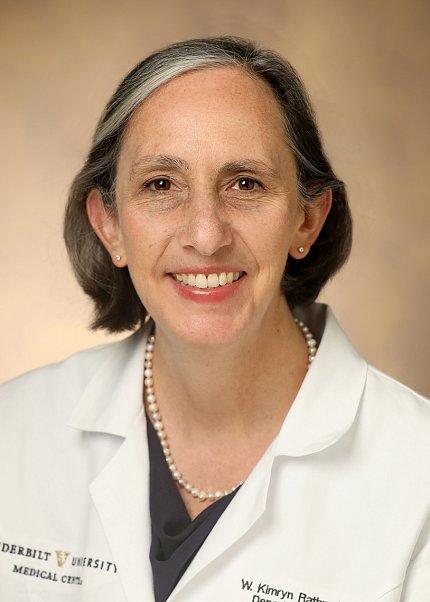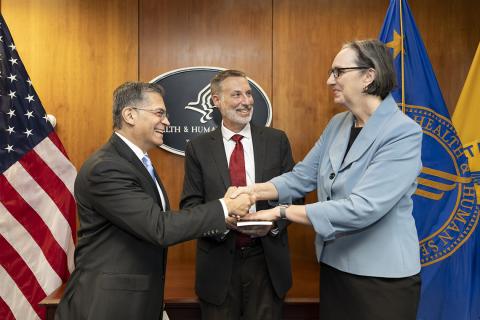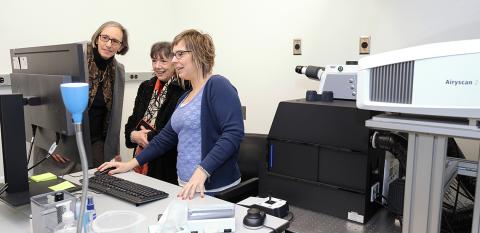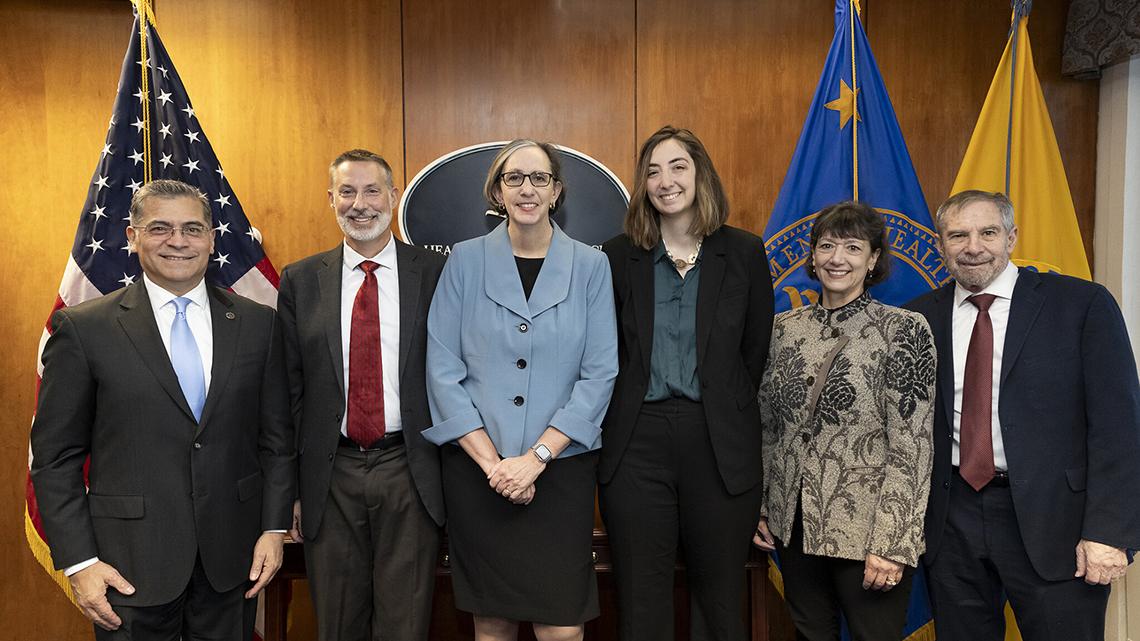In the Zone
Rathmell Leads Ambitious Charge Against Cancer

When the call came, Dr. Kimryn Rathmell couldn’t pass up the opportunity. Decades of experience, curiosity and drive all led her to this moment. In December, Rathmell became the 17th presidentially appointed director of the National Cancer Institute (NCI).
“This is an incredible period of time for cancer research in terms of having such amazing scientific talent, technologies to make more and faster discoveries that cure more patients, and an administration that’s so supportive,” she said during a recent interview.
Rathmell, a physician-scientist and oncologist who specializes in kidney cancer, most recently served as chair of medicine and physician-in-chief at Vanderbilt University. Deeply committed to research, innovation and patient care—and with longstanding ties to NCI—she took the helm shortly after Dr. Monica Bertagnolli left NCI to become NIH director.
Invigorated to make an impact, Rathmell has hit the ground running to advance the goals of the reignited Cancer Moonshot toward ending cancer as we know it.
Building Things
As a child, Rathmell developed a passion for science, education and the inner workings of all things from her parents. Her father taught middle school earth science; her mother taught shop class.
“I grew up loving to take things apart and put them back together, just to get a sense for how they work,” she said. “I also really enjoy solving a complex problem—from understanding how molecules interact in a pathway to how people interact in a system.”
In talking with people around NCI and across the cancer community, “I’m applying that same fascination to understand how the parts fit together,” she said. “It’s helping me find organizational knots we can untangle, so we can make operations and collaborations smoother.”
Becoming NCI Point Guard

Photo: Amy Rossetti
Growing up as a tall girl in the Midwest, Rathmell played basketball and developed a lifelong love of the sport. Her husband of 33 years, Jeff, also a cancer scientist, and two grown children are all big fans as well. Over the years, the game has shaped her career outlook as a scientist and leader.
“I’ve learned from basketball how practice and coaching are essential to building the skills and muscle memory that win games,” she said. “Winning happens when a team gets ‘into the zone.’ It’s thrilling to watch and even more thrilling to be in the game when that magic happens. I see my role as NCI director the same way—making sure we have the right mix of players, helping them work well together and bringing out the best in everyone so that same magic happens.”
Leading NCI, she’s now calling the shots. A big part of her strategy, she said, is listening.
Rathmell got a broad view of the cancer research landscape as a long-time NCI grant recipient, advisor and researcher in the Cancer Genome Atlas program.
“As NCI director, I now have a much broader view,” she said. “While the end goal of our collective work is straightforward, how the cancer research enterprise fits together and how NCI empowers that work is massive in scope and complicated.”
Listening to experts throughout NCI and beyond is pointing her toward the advances while showing her the potential to break through silos and enhance cohesion across this vast effort.
In taking on leadership roles, Rathmell admits she misses running a lab and interacting with patients. But “I carry with me each win and loss we experienced together,” she said. In guiding NCI, she’s grateful “to help scientists across the field have ‘aha’ moments that transform what is possible and translate them to wins for so many more patients.”
Last year, NCI launched a game plan.
Reaching Moonshot Goals

Photo: Chia-Chi Charlie Chang
“I’m a big believer in the National Cancer Plan, which has provided a much-needed roadmap to focus and align our nation’s collective efforts against cancer,” she said.
The Cancer Moonshot set an ambitious agenda to cut the cancer death rate by 50% by 2047, a goal Rathmell deems realistic.
“We’ve already seen what science can do, thanks to sustained strong investment in our work and the dedication of so many researchers, patients, families and advocates,” she said. “Having the energy and momentum from the White House is really valuable and it’s galvanizing people around our effort to achieve this goal.”
Rathmell reflected on how far we’ve already come, even for the most stubborn types of cancer. She recalled her first patient with renal medullary carcinoma, a rare kidney cancer with a three-month survival rate. The African-American teenager lived for a year following the experimental regimen, allowing him to graduate from high school.
“I came away from that experience knowing we had to make a difference for kids like him,” she said. “Now, we have a much better handle on this cancer’s biology” and new NCI-led clinical trials are underway.
“Collective action and advances in science and care have given kidney cancer a totally different outlook,” she said. And for many types of cancer, “now we have therapies that can extend life by years or even eradicate the cancers entirely.”
Rathmell lauded the new FDA approval of a cellular therapy for melanoma, the first such treatment approved for a solid tumor. Such advances pave the way for possible treatments for more solid cancers.
The best prognosis still comes from catching cancer early, before it becomes difficult to treat. Multiple efforts are now underway to develop tools for earlier detection, including an NCI-funded AI model that can identify pancreatic cancer more than 400 days before clinical diagnosis.
NCI also recently launched the Cancer Screening Research Network to evaluate other emerging technologies for cancer screening that ultimately could help many more people live longer.
Championing Change

Photo: Amy Rossetti
Rathmell is the second woman to serve as NCI director.
“I’d like us to get to the point that it’s not news or at all unusual when a woman is named to a top job in science,” she said.
Rathmell urges other women leaders to train and mentor future female leaders in science. “It can make such a difference when women early in their careers have a woman in a leadership role as a champion for them in their journey,” she said.
NCI remains committed to building a diverse and inclusive workforce, increasing research participation among underrepresented populations and identifying more ways to reduce cancer health disparities.
The National Cancer Plan is working to find and close the gaps. Eliminating inequities is one of eight overarching goals of the plan and a tenet within every goal.
“We don’t have enough people from all populations participating in research to produce the science that will provide equitable benefits to everyone,” Rathmell said. “That’s why ‘engage every person’ is one of the National Cancer Plan’s goals and one I very much take to heart.”
Another new screening program NCI launched may provide greater access to more people. The Self-collection for HPV testing to Improve Cervical Cancer Prevention (SHIP) trial network is assessing the effectiveness of people collecting their own samples to send in for HPV testing.
“Putting the ability to test directly into patients’ hands is a real opportunity to change the mindset around screening, bring screening to an entirely different group of patients and hopefully make a serious dent in disparities in cervical cancer incidence and mortality,” Rathmell said. “We’re continually looking at how we can do better to advance equity in every cancer arena.”
It’s a full court press and Rathmell is leading the charge to extend life and eradicate cancer.
“To me, progress against cancer is about people,” she said, “and a big puzzle piece is empowering the science and care workforce to do its best possible work. We need smart and dedicated people in every facet of what we do, and we need to ensure we have a pipeline of diverse talent, equipped to sustain and build on today’s advances.”
